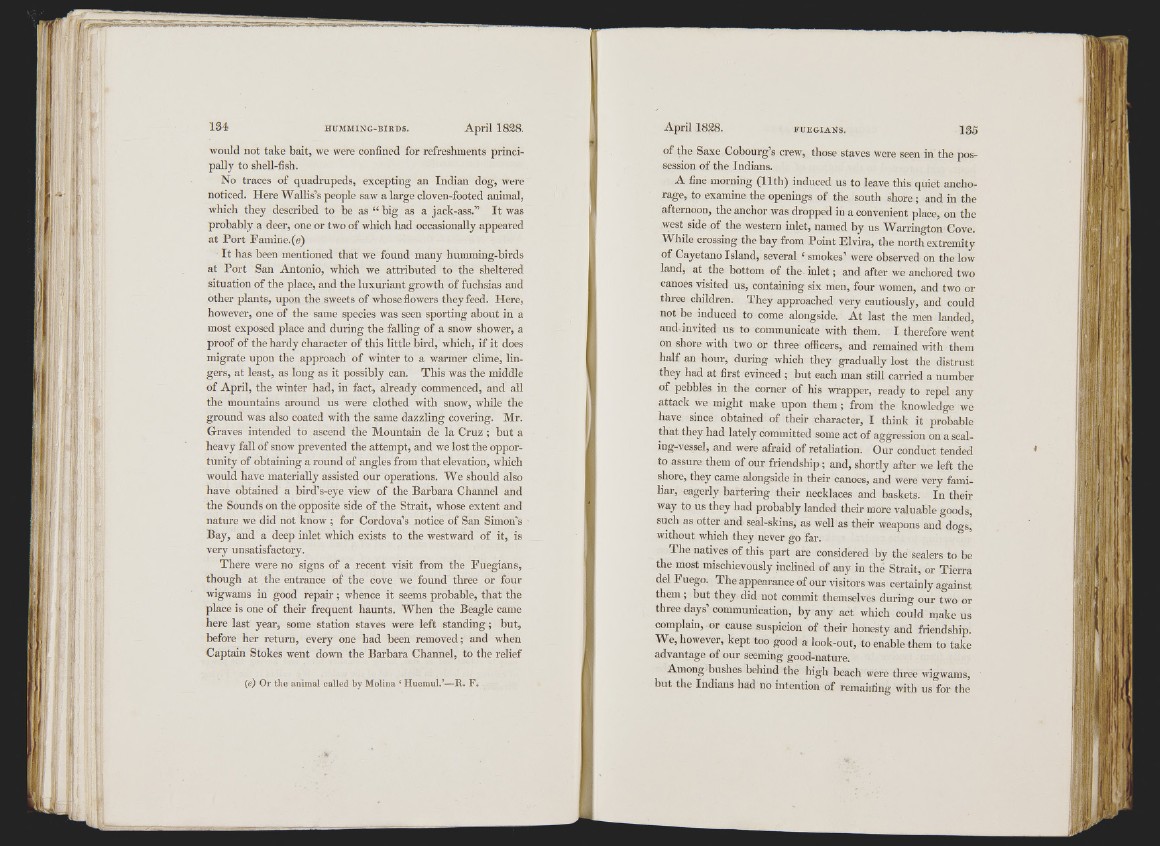
i
':i !*
¡1' H
would not take bait, we were confined for refreshments principally
to sheU-fish.
No traces of quadrupeds, excepting an Indian dog, were
noticed. Here Wallis’s people saw a large cloven-footed animal,
which they described to be as “ big as a jack-ass.” It was
probably a deer, one or two of which had occasionally appeared
at Port Famine, (e)
It has been mentioned that we found many humming-birds
at Port San Antonio, which we attributed to the sheltered
situation of the place, and the luxuriant growth of fuchsias and
other plants, upon the sweets of whose flowers they feed. Here,
however, one of the same species was seen sporting about in a
most exposed place and during the falling of a snow shower, a
proof of the hardy character of this little bird, which, if it does
migrate upon the approach o f winter to a warmer clime, lingers,
at least, as long as it possibly can. This was the middle
of April, the winter had, in fact, already commenced, and all
the mountains around us were clothed with snow, while the
ground was also coated with the same dazzling covering. Mr.
Graves intended to ascend the Mountain de la Cruz ; but a
heavy fall of snow prevented the attempt, and we lost the opportunity
of obtaining a round of angles from that elevation, which
would have materially assisted our operations. We should also
have obtained a bird’s-eye view of the Barbara Channel and
the Sounds on the opposite side of the Strait, whose extent and
nature we did not know ; for Cordova’s notice of San Simon’s
Bay, and a deep inlet which exists to the westward of it, is
very unsatisfactory.
There were no signs of a recent visit from the Fuegians,
though at the entrance of the cove we found three or four
wigwams in good repair; whence it seems probable, that the
place is one of their frequent haunts. When the Beagle came
here last year, some station staves were left standing; but,
before her return, every one had heen removed; and when
Captain Stokes went down the Barbara Channel, to the relief
(e) Or the animal called by Molina ‘ Huemul.’—R. F.
of the Saxe Cobourg’s crew, those staves were seen in the possession
of the Indians.
A fine morning (11th) induced us to leave this quiet anchorage,
to examine the openings of the south shore; and in the
afternoon, the anchor was dropped in a convenient place, on the
west side of the western inlet, named by us Warrington Cove.
While crossing the bay from Point Elvira, the north extremity
of Cayetano Island, several ‘ smokes’ were observed on the low
land, at the bottom of the inlet; and after we anchored two
canoes visited us, containing six men, four women, and two or
three children. They approached very cautiously, and could
not be induced to come alongside. At last the men landed,
and invited us to communicate with them. I therefore went
on shore with two or three officers, and remained with them
half an hour, during which they gradually lost the distrust
they had at first evinced ; but each man still carried a number
of pebbles in the comer of his wrapper, ready to repel any
attack we might make upon them ; from the knowledge we
have since obtained of their character, I think it probable
that they had lately committed some act of aggression on a sealing
vessel, and were afraid of retaliation. Our conduct tended
to assure them of our friendship; and, shortly after we left the
shore, they came alongside in their canoes, and were very familiar,
eagerly bartering their necklaces and baskets. In their
way to us they had probably landed their more valuable goods,
such as otter and seal-skins, as well as their weapons and dogs,
without which they never go far. ^
The natives of this part are considered by the sealers to be
the most mischievously inclined of any in the Strait, or Tierra
del Fuego. The appearance of our visitors was certainly against
them; but they did not commit themselves during our two or
three days’ communication, by any act which could make us
complain, or cause suspicion of their honesty and friendship.
We, however, kept too good a look-out, to enable them to take
advantage of our seeming good-nature.
Among bushes behind the high beach were three wigwams,
but the Indians had no intention of remaining with us for tlie